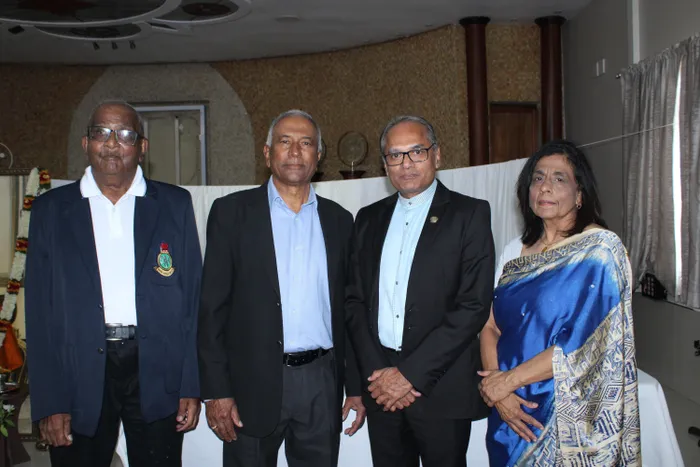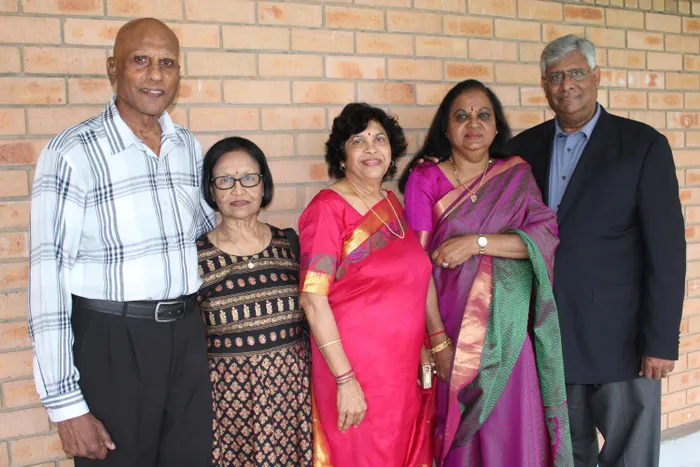
At the event were: Loga Naicker, from left, Logan Moodley, Les Govender, and Dr Vijay Reddy.
Image: Yoshini Perumal
SEVERAL decades ago, community-conscious Indian leaders in South Africa built schools with little more than grit and grace.
Under apartheid’s shadow, they pooled pennies, stitched uniforms by hand, and taught under trees – believing that education was not just a ladder out of poverty, but a torch to light the way for generations.
So said Les Govender, deputy chairperson of the National Council of Provinces (NCOP), when he addressed descendants of pioneer Chatsworth farmers at the annual reunion hosted by the Chatsworth Vernacular School Institute (CVSI).
The topic of his speech was, “Protecting, Preserving and Promoting our Heritage Institutions in the Context of South Africa’s Constitutional Democracy”.
The CVSI built the Bayview School 87 years ago and it is still in use by the Sathya Sai Education Trust.
“When we speak of legacy, we need not look far. The very walls around us built decades ago continue to echo the dreams of elders who placed education above comfort, above convenience, above all,” said Govender.

Siva Govender, from left, Shanti Govender, Aumsie Moodley, Rajes Devan and Yogin Devan.
Image: Yoshini Perumal
“This school is more than just a structure; it is a sanctuary of hope, resilience, and intergenerational promise envisioned by banana farmers and market gardeners who lived in Chatsworth before it became a municipal housing scheme.
"Sadly, such respect and value placed on education is foreign to a large section of society today. The destruction at the University of Fort Hare last week is indeed staggering: students protesting governance issues and unmet needs resorted to arson, setting fire to buildings and it will cost at least R500 million to replace.
“This moment invites reflection, not just on the anger of today’s youth, but on the sacrifices of those who came before. They pooled resources, taught under trees, and fought for dignity through education. Their vision was not just academic – it was emancipatory. To juxtapose that legacy with the torching of Fort Hare, a university that once nurtured giants like Oliver Tambo and Nelson Mandela, is to feel the ache of generational dissonance,” he said.
Govender added that by bringing together the descendants of pioneering farming families, the CVSI was respecting the importance of a community’s collective history and the role it played in preserving identity and the need to pass this on to future generations.
“Our constitution is founded on the principles of democracy, social justice, and human rights. Our heritage institutions, including museums, galleries and cultural organisations such as the CVSI, are essential in promoting these values and preserving our collective memory.
"Let us use this opportunity to engage in intergenerational conversation, reflecting on where we come from and where we want to go as a society in general, and Chatsworth in particular,” he said.
Speaking at the same function, Dr Vijay Reddy, chairperson of the CVSI, said the upward mobility of descendants of pioneer Chatsworth farmers was testament of the wisdom and impact of their decision to invest in education by building Bayview School almost 90 years ago.
“Bayview School became a cradle for academic and sporting achievements and produced many men and women who became leaders in various fields. Today, the numbers regarding school and university output, give cause for concern. Presently, 50% of all South Africans, aged 25 years and older (adults), have written and passed the matriculation examination.
“Just under half the black African and coloured adults have completed the matric certificate examinations. Nealy 80% of Indian adults and 90% of white adults have completed their matric,” said Dr Reddy.
Turning to university education, she said overall, 7% (7 in every 100) of South African adults have a degree qualification.
By population groups, 5% of black African and coloured adults completed a degree qualification.
“The picture is different for Indian and white adults: 20% of Indians and 30% of white adults have a degree.
“The disparity in matric pass rates and university degree completion among South Africa’s racial groups reflects deep-rooted structural inequalities that persist despite decades of reform. To improve educational and labour market outcomes, the policy priority should be to build foundational knowledge and skills in numeracy.
“Not achieving basic foundational skills of being able to read with comprehension, writing and do basic mathematics operations, leaves the child unprepared for the complexities of the curriculum beyond Grade 3.
“Research has shown conclusively that once pupils fall behind on foundational literacy and numeracy, they tend to maintain flat learning curves for years, perpetually unable to catch up,” Dr Reddy said.